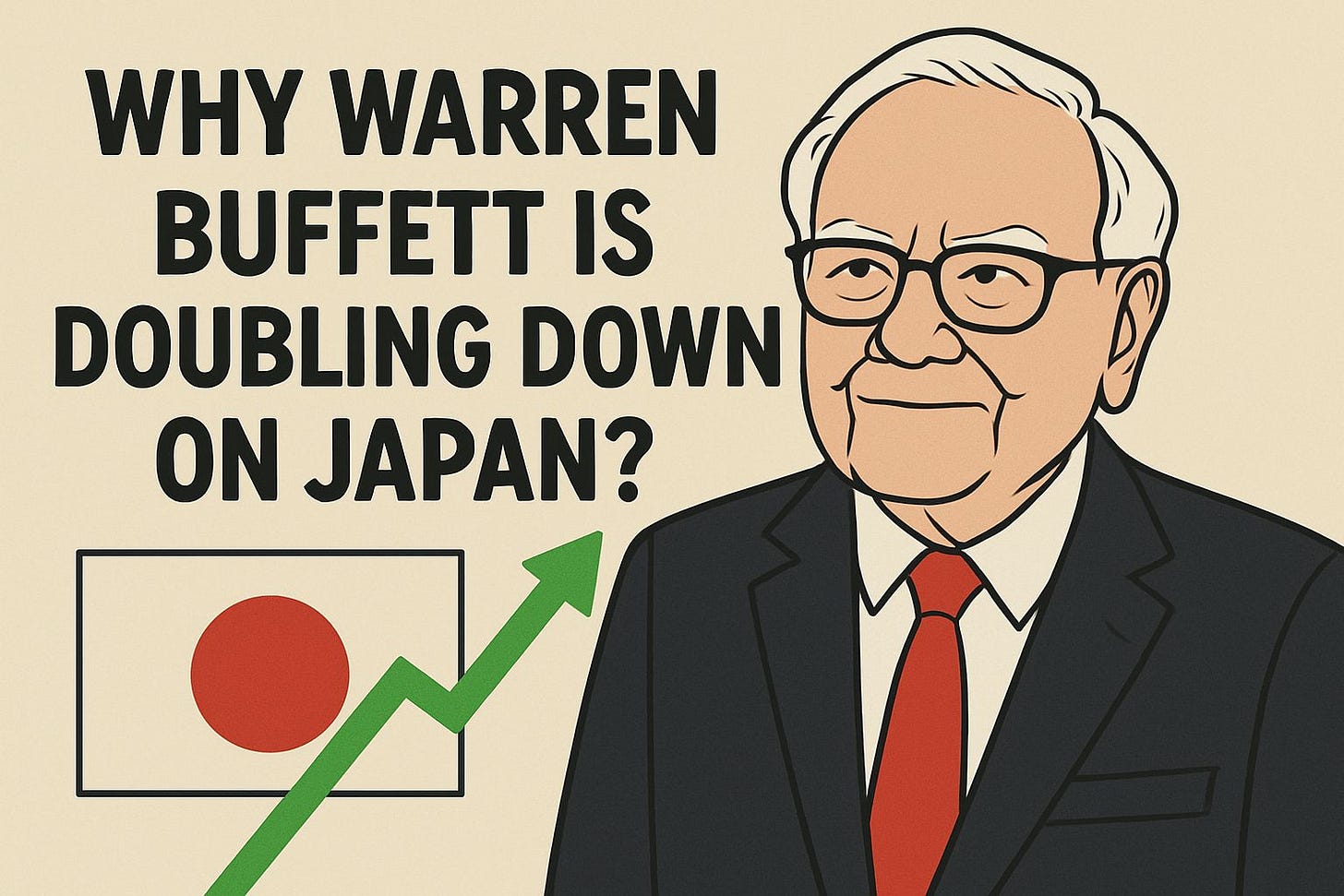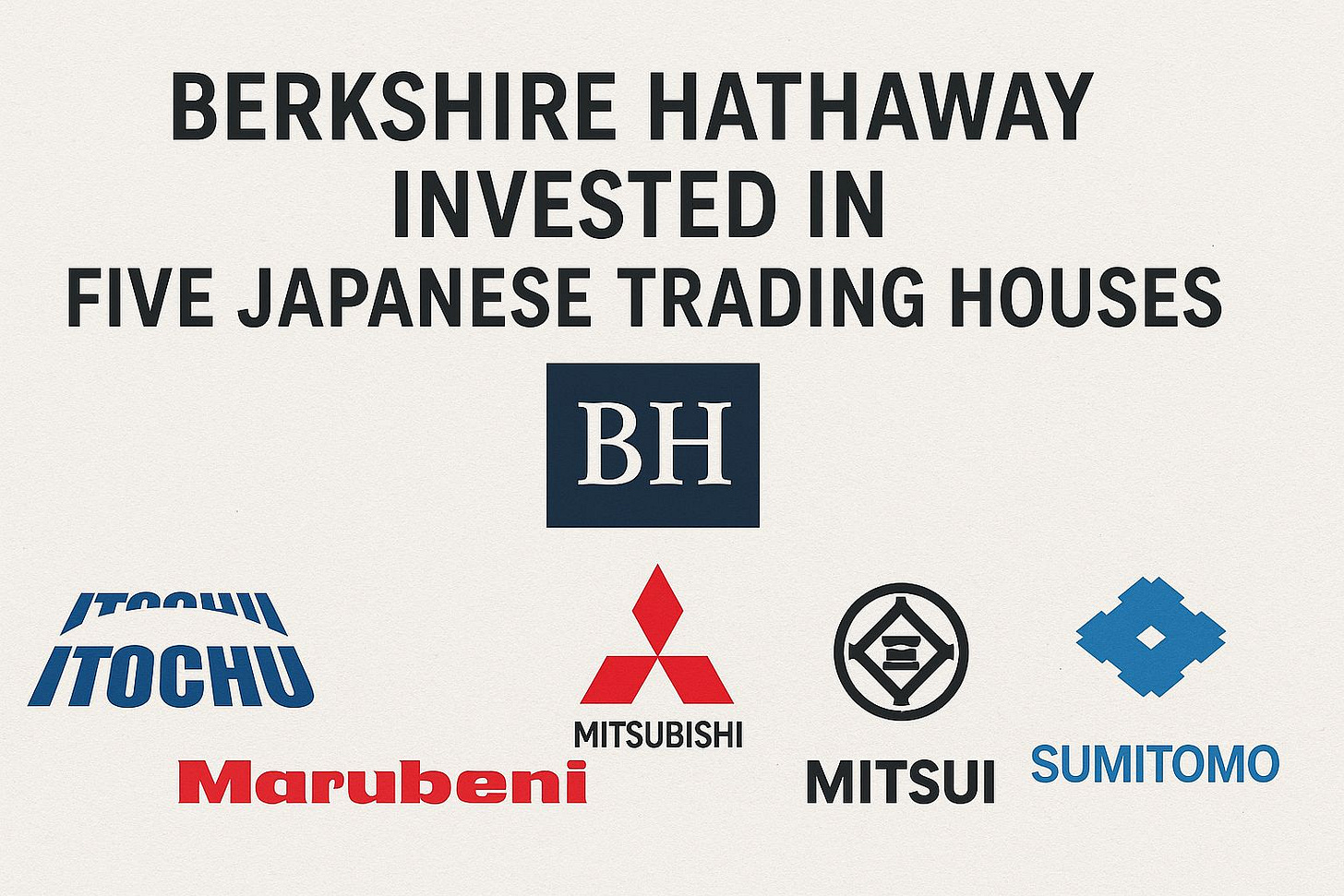Why Warren Buffett is Doubling Down on Japan?
The Oracle's Eastern Strategy with Global roots.
Dear Investor,
Zee here. Here's something that might surprise you: While most investors are chasing the latest AI stock or meme coin, Warren Buffett has been quietly building one of his largest international positions in companies most Americans have never heard of. This was revealed in both Berkshire Hathaway and the Japanese companies’ regulatory fillings.
I'm talking about Japan's trading houses or "sogo shosha" as they're known locally. And the recent news should make every value investor sit up and take notice.
Let's dive in.
Berkshire's Japanese holdings quietly grows
Warren Buffett's Berkshire Hathaway just increased its stakes in Mitsubishi Corp. and Mitsui & Co., with the Mitsubishi holding now reaching 10.23% on a voting rights basis. This isn't just a minor adjustment, it's a clear signal that the Oracle of Omaha sees something others are missing.
But this isn't a new story. Berkshire has systematically increased its stakes in five Japanese trading houses: Itochu, Marubeni, Mitsubishi, Mitsui, and Sumitomo by between 1% to 1.7% points, giving the firm stakes ranging from 8.5% to 9.8%.
The numbers tell a compelling story: Berkshire's Japanese holdings amounted to $23.5 billion at the end of 2024, at an aggregate cost of $13.8 billion. That's a roughly 70% gain on one of the most methodical investment plays of the decade.
What Exactly Are These Trading Houses?
If you're like most Western investors, you might be scratching your head wondering what these companies actually do. Think of them as the Swiss Army knives of the business world. They act as intermediaries in global trade, but have evolved far beyond simple trading (i.e. buy/sell). They buy, sell, transport, store, process, and finance commodities and manufactured goods worldwide. Think of them as global supply chain orchestrators.
These aren't your typical "trading" companies. Japan's sogo shosha are massive conglomerates with tentacles reaching into virtually every corner of the global economy:
Energy and Resources: From oil and gas exploration to renewable energy projects
Technology and Innovation: Semiconductors, telecommunications infrastructure, and digital transformation
Real Estate and Infrastructure: Major development projects across Asia and beyond
Consumer Goods and Retail: Everything from convenience stores to luxury brands
Financial Services: Banking, insurance, and investment operations
These firms trade below 1x price-to-book ratio, leveraging diversified cash flows across energy, tech, and rare-earth supply chains. In other words, you're buying dollar bills for 80 cents—classic Buffett territory.
The Berkshire Playbook in Action
This Japanese strategy showcases everything we love about Buffett's approach:
1. Value at Reasonable Prices While U.S. markets trade at historically high multiples, these Japanese giants offer the kind of value that's become increasingly rare in developed markets.
2. Diversification Through Single Stocks Each trading house is essentially a diversified portfolio wrapped in a single stock. You get exposure to dozens of industries and geographic regions through one investment.
3. Currency Hedging In contrast, Berkshire sold a net $134 billion in equities in 2024, ending the year with a cash pile of $334.2 billion. By investing in yen-denominated assets while the dollar potentially weakens, Buffett is positioning for currency appreciation as well as business growth.
4. Long-Term Thinking Berkshire had bought into the five houses in the summer of 2019.
The Bottom Line
This Japanese strategy becomes even more interesting when viewed against Berkshire's recent actions. Meanwhile, U.S. stocks began nose-diving in mid-February after President Donald Trump's policies created uncertainty, yet Buffett continued building his Japanese position.
This suggests something profound: the world's greatest investor may be positioning for a world where the best opportunities lie outside America's increasingly expensive markets.
The implications extend beyond individual stock picking. We might be witnessing a geographic rotation in global value, from overpriced U.S. assets to undervalued international opportunities.
As Buffett himself once said: "Price is what you pay, value is what you get." In Japan's trading houses, he's found companies where the value far exceeds the price—even after a 70% gain.
That's not just good investing. That's Buffett at his best.
Disclaimer: All information here is for educational purposes only. This is not financial advice. Please do your own research and speak with a licensed advisor before making any investment decisions. Past performance is not indicative of future returns.



